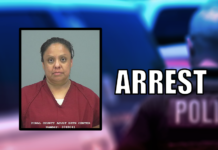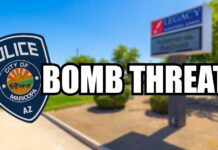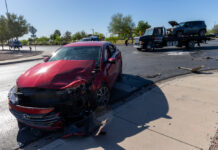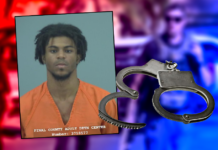
Many of the new institutions and roads in fast-growing Maricopa go unidentified by some of today’s GPS products and phone applications, making it difficult for residents to maneuver around closed roads.
On Saturday, Police Chief Steve Stahl shared tips during his monthly coffee with residents on negotiating city streets. Also, during Saturday’s presentation, firefighters shared information on CPR.
“This station and city hall aren’t on the map because of GIS mapping, which is run through Pinal County,” Stahl said. Saturday event was held at Fire Station No. 575, 45695 W. Edison Road.
However, there are ways residents can minimize the problem. Nixle, a free subscription notification program used by the police department, gives real-time information on what roads are closed and sends notifications to mobile devices allowing residents to plan ahead.
Nixle includes the reason for a roads closure, which may help drivers figure out how long a road might be closed.
Roads can be closed for traffic accidents, crime scenes, traffic-light malfunctions or hazardous-material spills that can cause lengthy cleanup.
Police recommended drivers pull over to the side of the road and start planning an alternative route immediately when they encounter a collision or road closing
“You can get out of the subdivisions pretty easy, they are all designed with multiple ways out,” said Maricopa Police Officer Chris Evans. “You can even go north by heading south.”
Prior to the police talking about road closures, fire department Capt. Chip Wright and public information officer Brad Pitassi talked about CPR, stressing the most important thing to remember in any cardiac situation is to call 911 as soon as possible.
“The earlier you can get paramedics on scene, the better the chances are for survival,” Pitassi said.
Wright covered some of the changes to CPR protocol, which is now a hands-only process and no longer uses the rescue breaths once taught, as well as Automated External Defibrillator (AED) machines.
“The AED’s talk to you and tell you what to do,” Wright said. “They are easy for us to use, as it is for you to use.”

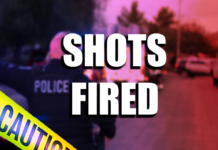
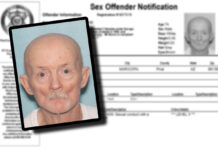
![Alleged car thief released without charges Phoenix police stop a stolen vehicle on April 20, 2024. [Facebook]](https://www.inmaricopa.com/wp-content/uploads/2024/04/IMG_5040-218x150.jpg)

